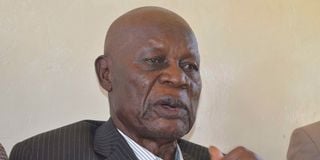Wrangles in council of elders as Otondi burial date announced

Willis Otondi, the chairman of the Luo Council of Elders who died last week, will be buried on March 4, 2023.
Willis Otondi, the chairman of the Luo Council of Elders who died last week, will be buried on March 4, 2023, but debate on his succession has already started in earnest.
In his death, controversy still stalks the legality of the position he held even as his nemesis for years, Mzee Nyandiko Ong’adi, insists that he is the bona fide Ker of the Luo community.
The Ong’adi faction has always maintained that he was elected by the community to lead them, while Otondi was a political appointee chosen by opposition chief Raila Odinga.
Also read: Raila Odinga announces return of mass action
The tiff over who is the true leader of the Luo Council of Elders has split the community into two and has, on many occasions placed the two warring sides on either side of the political divide.
The wrangles that have gone on for more than a decade started when Riaga Ogallo was at the helm of the council.
He was dramatically ejected and replaced by Otondi at Sony Sugar grounds, Awendo, in Migori County in 2010 in a ceremony presided over by then-Prime Minister Odinga.
The council’s constitution states that one can only cease to be chairman if he dies or is mentally incapacitated. Ogallo maintained he was the legitimate chairman, following successful court orders, and later the council replaced Otondi and his entire executive team. Ogallo died in 2015 at 80 years old.
There have been attempts to end the wrangles that have dogged the council, with Mr Odinga trying to arbitrate and bring the two factions together, in vain.
In 2018, Otondi was named chairman after a six-hour closed-door meeting chaired by the opposition leader at his Opoda home in Bondo, Siaya County.
Mr Adera Osawa, who was the secretary-general of a parallel council headed by Mr Og’adi, took the same position while the latter, who has always held that he is the legitimate Ker, was appointed executive director of the Council.
However, wrangles continue to rock the council to date.
An interview with Mr Ong’adi revealed the deep resentment that has existed over the years between the two factions.
He maintains that Otondi was a political appointee not recognised by the community and the national government.
“I will be attending the burial next month to bury Otondi as an ordinary elder of the council, and not Ker. I am the recognised and bona fide chairman of the Luo Council of elders while he was enthroned by Mr Odinga at Sony, Awendo,” said Mzee Ong’adi.
He stated that his name and those of the current officials are with the Registrar of Societies, making them the legal officials of the council.
He pointed out that his position is legitimate and that is why he is the one representing the community at national functions.
However, Mr Odungi Randa, an executive member of the Kisumu Luo Council of elders condemned Mr Ong’adi, dismissing claims that he is the chairman of the council.
He spoke to the Nation on the sidelines of a meeting of the Central Committee, formed to plan the funeral of Otondi.
“We have our Luo customs, and after we bury our Ker, we shall follow them to elect a new one. Mr Ong’adi, apparently, doesn’t understand this,” said Mr Randa.
The council wars and scramble for positions is not only within the Luo Council of elders, but in other communities too.
Politicians have taken up the councils and usually choose who to associate with depending on their allegiance.
The Njuri Ncheke council of elders’ leadership has enjoyed peace for the past three years, after a four-year old row was resolved in 2019.
The council has had two factions since 2014, when political differences pitting top politicians in the county divided the elders down the middle.
A court battle that lasted four years was settled after the elders entered an out-of-court settlement after protracted talks. One faction was led by the late Paul M’Ethingia while another was headed by Mr Linus Kathera.
In the out-of-court settlement, leaders from each faction shared positions in an expanded leadership structure.Mr Kathera became the chairman of the united council while Josphat Murangiri was appointed secretary-general, operations, and his rival Washington Mbaya became secretary-general in charge of programmes.
Several other positions were created to accommodate leaders from the two rival camps.It was agreed that a chairman holds the position for 10 years.






